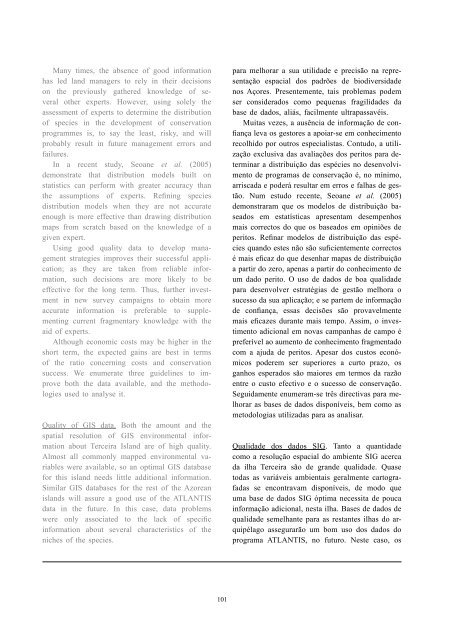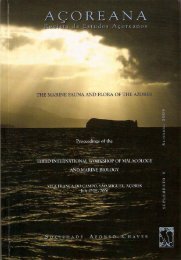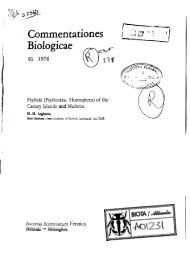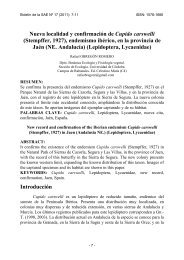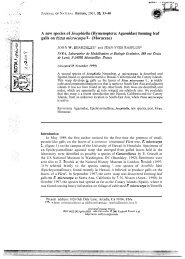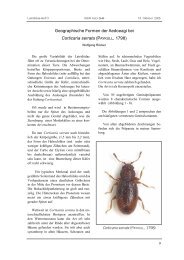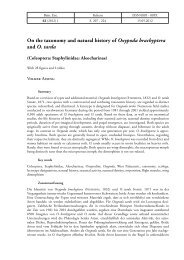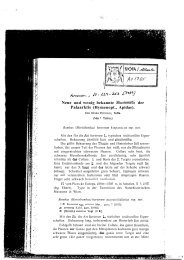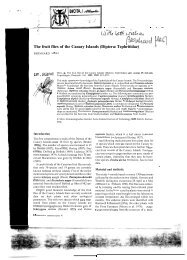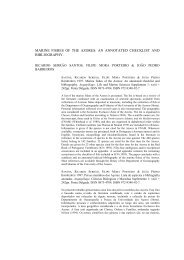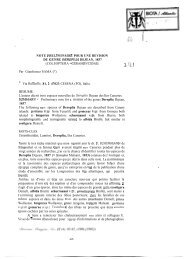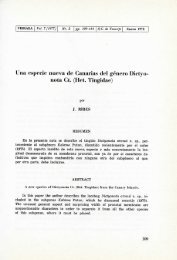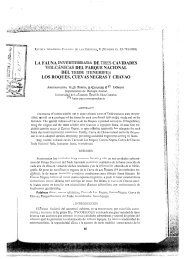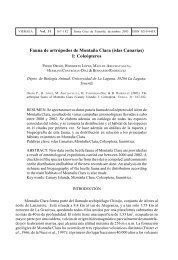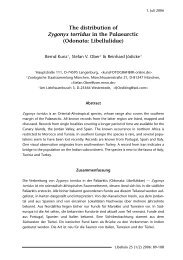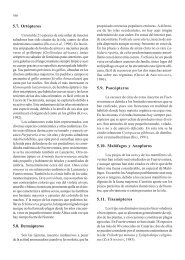(eds.) (2005). - Portal da Biodiversidade dos Açores - Universidade ...
(eds.) (2005). - Portal da Biodiversidade dos Açores - Universidade ...
(eds.) (2005). - Portal da Biodiversidade dos Açores - Universidade ...
Create successful ePaper yourself
Turn your PDF publications into a flip-book with our unique Google optimized e-Paper software.
Many times, the absence of good information<br />
has led land managers to rely in their decisions<br />
on the previously gathered knowledge of several<br />
other experts. However, using solely the<br />
assessment of experts to determine the distribution<br />
of species in the development of conservation<br />
programmes is, to say the least, risky, and will<br />
probably result in future management errors and<br />
failures.<br />
In a recent study, Seoane et al. (<strong>2005</strong>)<br />
demonstrate that distribution models built on<br />
statistics can perform with greater accuracy than<br />
the assumptions of experts. Refining species<br />
distribution models when they are not accurate<br />
enough is more effective than drawing distribution<br />
maps from scratch based on the knowledge of a<br />
given expert.<br />
Using good quality <strong>da</strong>ta to develop management<br />
strategies improves their successful application;<br />
as they are taken from reliable information,<br />
such decisions are more likely to be<br />
effective for the long term. Thus, further investment<br />
in new survey campaigns to obtain more<br />
accurate information is preferable to supplementing<br />
current fragmentary knowledge with the<br />
aid of experts.<br />
Although economic costs may be higher in the<br />
short term, the expected gains are best in terms<br />
of the ratio concerning costs and conservation<br />
success. We enumerate three guidelines to improve<br />
both the <strong>da</strong>ta available, and the methodologies<br />
used to analyse it.<br />
Quality of GIS <strong>da</strong>ta. Both the amount and the<br />
spatial resolution of GIS environmental information<br />
about Terceira Island are of high quality.<br />
Almost all commonly mapped environmental variables<br />
were available, so an optimal GIS <strong>da</strong>tabase<br />
for this island ne<strong>eds</strong> little additional information.<br />
Similar GIS <strong>da</strong>tabases for the rest of the Azorean<br />
islands will assure a good use of the ATLANTIS<br />
<strong>da</strong>ta in the future. In this case, <strong>da</strong>ta problems<br />
were only associated to the lack of specific<br />
information about several characteristics of the<br />
niches of the species.<br />
101<br />
para melhorar a sua utili<strong>da</strong>de e precisão na representação<br />
espacial <strong>dos</strong> padrões de biodiversi<strong>da</strong>de<br />
nos <strong>Açores</strong>. Presentemente, tais problemas podem<br />
ser considera<strong>dos</strong> como pequenas fragili<strong>da</strong>des <strong>da</strong><br />
base de <strong>da</strong><strong>dos</strong>, aliás, facilmente ultrapassavéis.<br />
Muitas vezes, a ausência de informação de confiança<br />
leva os gestores a apoiar-se em conhecimento<br />
recolhido por outros especialistas. Contudo, a utilização<br />
exclusiva <strong>da</strong>s avaliações <strong>dos</strong> peritos para determinar<br />
a distribuição <strong>da</strong>s espécies no desenvolvimento<br />
de programas de conservação é, no mínimo,<br />
arrisca<strong>da</strong> e poderá resultar em erros e falhas de gestão.<br />
Num estudo recente, Seoane et al. (<strong>2005</strong>)<br />
demonstraram que os modelos de distribuição basea<strong>dos</strong><br />
em estatísticas apresentam desempenhos<br />
mais correctos do que os basea<strong>dos</strong> em opiniões de<br />
peritos. Refinar modelos de distribuição <strong>da</strong>s espécies<br />
quando estes não são suficientemente correctos<br />
é mais eficaz do que desenhar mapas de distribuição<br />
a partir do zero, apenas a partir do conhecimento de<br />
um <strong>da</strong>do perito. O uso de <strong>da</strong><strong>dos</strong> de boa quali<strong>da</strong>de<br />
para desenvolver estratégias de gestão melhora o<br />
sucesso <strong>da</strong> sua aplicação; e se partem de informação<br />
de confiança, essas decisões são provavelmente<br />
mais eficazes durante mais tempo. Assim, o investimento<br />
adicional em novas campanhas de campo é<br />
preferível ao aumento de conhecimento fragmentado<br />
com a aju<strong>da</strong> de peritos. Apesar <strong>dos</strong> custos económicos<br />
poderem ser superiores a curto prazo, os<br />
ganhos espera<strong>dos</strong> são maiores em termos <strong>da</strong> razão<br />
entre o custo efectivo e o sucesso de conservação.<br />
Segui<strong>da</strong>mente enumeram-se três directivas para melhorar<br />
as bases de <strong>da</strong><strong>dos</strong> disponíveis, bem como as<br />
metodologias utiliza<strong>da</strong>s para as analisar.<br />
Quali<strong>da</strong>de <strong>dos</strong> <strong>da</strong><strong>dos</strong> SIG. Tanto a quanti<strong>da</strong>de<br />
como a resolução espacial do ambiente SIG acerca<br />
<strong>da</strong> ilha Terceira são de grande quali<strong>da</strong>de. Quase<br />
to<strong>da</strong>s as variáveis ambientais geralmente cartografa<strong>da</strong>s<br />
se encontravam disponíveis, de modo que<br />
uma base de <strong>da</strong><strong>dos</strong> SIG óptima necessita de pouca<br />
informação adicional, nesta ilha. Bases de <strong>da</strong><strong>dos</strong> de<br />
quali<strong>da</strong>de semelhante para as restantes ilhas do arquipélago<br />
assegurarão um bom uso <strong>dos</strong> <strong>da</strong><strong>dos</strong> do<br />
programa ATLANTIS, no futuro. Neste caso, os


